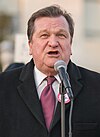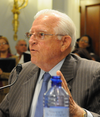
Carlos Antonio Romero Barceló was a Puerto Rican politician who served as the governor of Puerto Rico from 1977 to 1985. He was the second governor to be elected from the New Progressive Party (PNP). He also served 2 terms in Congress as the Resident Commissioner of Puerto Rico from 1993 to 2001.

The District of Columbia statehood movement is a political movement that advocates making the District of Columbia a U.S. state, to provide the residents of the District of Columbia with voting representation in the Congress and complete control over local affairs.

Voting rights of citizens in the District of Columbia differ from the rights of citizens in the 50 U.S. states. The United States Constitution grants each state voting representation in both houses of the United States Congress. It defines the federal district as being outside of any state, and does not grant it any voting representation in Congress. The Constitution grants Congress exclusive jurisdiction over the District in "all cases whatsoever".

Jenniffer Aydin González Colón is a Puerto Rican politician who serves as the 20th Resident Commissioner of Puerto Rico. González has served in leadership positions in the New Progressive Party of Puerto Rico (PNP) and in the Republican Party of the United States. These positions included being the chairwoman of the Puerto Rico Republican Party, speaker and minority leader of the House of Representatives of Puerto Rico, and vice-chair of the PNP. González is the youngest person to be Resident Commissioner and the first woman to hold the role.

In the United States, a state is a constituent political entity, of which there are 50. Bound together in a political union, each state holds governmental jurisdiction over a separate and defined geographic territory where it shares its sovereignty with the federal government. Due to this shared sovereignty, Americans are citizens both of the federal republic and of the state in which they reside. State citizenship and residency are flexible, and no government approval is required to move between states, except for persons restricted by certain types of court orders.

The District of Columbia Democratic State Committee is the affiliate of the Democratic Party in the District of Columbia.

The Puerto Rico statehood movement aims to make Puerto Rico a state of the United States. Puerto Rico is an unincorporated territorial possession of the United States acquired in 1898 following the Spanish–American War, making it "the oldest colony in the modern world". As of 2023, the population of Puerto Rico is 3.2 million, around half the average state population and higher than that of 19 U.S. states. Statehood is one of several competing options for the future political status of Puerto Rico, including: maintaining its current status, becoming fully independent, or becoming a freely associated state. Puerto Rico has held six referendums on the topic. These are non-binding, as the power to grant statehood lies with the US Congress. The most recent referendum was in November 2020, with a majority (52.52%) of those who voted opting for statehood.
There are differing points of view on whether Puerto Rico's current political status as a territory of the United States should change. Four major viewpoints emerge in principle: that Puerto Rico maintains its current status, becomes a US state, becomes fully independent, or becomes a freely associated state.

On March 23, 1971, the District of Columbia held a special election for its non-voting House delegate representing the District of Columbia's at-large congressional district. This was the first election for the newly re-created district since Norton P. Chipman briefly held the seat during the Reconstruction Era. The winner of the race was Walter E. Fauntroy, a Democrat. After serving his remaining term in the 92nd United States Congress, he would continue to be re-elected until he stepped down to run for mayor in the 1990 election.

On November 7, 1972, the District of Columbia held an election for its non-voting House delegate representing the District of Columbia's at-large congressional district. The winner of the race was Walter E. Fauntroy (D), who won his first re-election after winning the special election in the previous year. All elected members would serve in 93rd United States Congress.

On November 5, 1974, the District of Columbia held an election for its non-voting House delegate representing the District of Columbia's at-large congressional district. The winner of the race was Walter E. Fauntroy (D), who won his second re-election. Independent candidate James G. Banks surprised many by taking second place, ahead of William R. Phillips (R) and D.C. Statehood Party candidate Anton V. Wood. All elected members would serve in 94th United States Congress.

A referendum on statehood for the District of Columbia was held on November 8, 2016. It was the first referendum on statehood to be held in the district. The District of Columbia was created following the passage of the Residence Act on July 9, 1790, which approved the creation of a national capital, the City of Washington on the Potomac River.

The 2021 United States elections were held in large part on Tuesday, November 2, 2021. This off-year election included the regular gubernatorial elections in New Jersey and Virginia. In addition, state legislative elections were held for the New Jersey Legislature and Virginia House of Delegates, along with numerous state legislative special elections, citizen initiatives, mayoral races, and a variety of other local elections. Six special elections to the United States House of Representatives also took place on November 2 or earlier as a result of either deaths or vacancies. The first of these was held on March 20.

A referendum of the status of Puerto Rico was held on November 3, 2020, concurrently with the general election. The Referendum was announced by Puerto Rico Governor Wanda Vázquez Garced on May 16, 2020. This was the sixth referendum held on the status of Puerto Rico, with the previous one having taken place in 2017. This was the first referendum with a simple yes-or-no question, with voters having the option of voting for or against becoming a U.S. state. The New Progressive Party (PNP), of whom Vázquez is a member, supports statehood, while the opposition Popular Democratic Party (PDP) and Puerto Rican Independence Party (PIP) oppose it.

The Washington, D.C., Admission Act, often referred to simply as the D.C. Admission Act, is a bill introduced during the 116th United States Congress. The bill would grant Washington, D.C., admission into the Union as a state. The bill was originally introduced in the 116th Congress on January 3, 2019, and was reintroduced on January 4, 2021, and January 9, 2023, in the 117th and 118th Congresses. The United States House of Representatives passed it on April 22, 2021.

The Puerto Rico Statehood Admission Act, H.R. 4901, was a bill introduced during the 116th United States Congress. The intention of the bill is to grant Puerto Rico, an unincorporated territory of the United States, admission into the Union as a state. The bill was originally introduced in the 116th Congress and was reintroduced as H.R. 1522, on March 2, 2021, in the 117th Congress. It was referred to the House Committee on Natural Resources with last action taken on June 16.

A special election to elect shadow senators and shadow representatives from Puerto Rico was held on May 16, 2021. Voters chose two special delegates to the United States Senate and four special delegates to the United States House of Representatives. Their work is to demand that the US Congress respect and enforce the results of the 2020 status referendum, and admit Puerto Rico as the 51st state of the Union.
The District of Columbia is a political division coterminous with Washington, D.C., the capital city of the United States. According to the Article One of the Constitution, only states may be represented in the United States Congress. The District of Columbia is not a U.S. state and therefore has no voting representation.
The District of Columbia is a political division coterminous with Washington, D.C., the capital city of the United States. According to the Article One of the Constitution, only states may be represented in the United States Congress. The District of Columbia is not a U.S. state and therefore has no voting representation in the United States Senate. However, it does have a non-voting delegate to represent it in the House.
Zoraida Buxó Santiago is a Puerto Rican politician currently serving as a Shadow United States Senator.




























